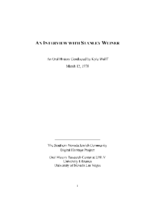Search the Special Collections and Archives Portal
Search Results

Transcript of interview with Oscar Goodman by Claytee D. White November 10, 2014
Date
Archival Collection
Description
Oscar Baylin Goodman (1939- ) is the former mayor of the city of Las Vegas, Nevada, serving 12 years until 2011, when he swore in his wife of over 50 years, Carolyn Goodman. Oscar Goodman is the official ambassador of Las Vegas, and the chairman of the Las Vegas Convention and Visitors Authority (LVCVA) Host Committee. He is also known as one of the best criminal defense attorneys in the United States, and spent 35 years defending alleged Mob figures such as Meyer Lansky, Frank Rosenthal, and Anthony Spilotro. Goodman is the primary visionary and a member of the board of directors of The Mob Museum in downtown Las Vegas, which opened in 2012. Goodman was born June 26, 1939 in Philadelphia, Pennsylvania. He earned his undergraduate degree from Haverford College in 1961 and his law degree from the University of Pennsylvania Law School in 1964. That same year he moved to Las Vegas and in 1965 he was admitted to the Nevada State Bar. He served as Clark County?s chief deputy public defender from 1966 to 1967. Goodman was elected as mayor of Las Vegas for the first time in 1999. During his three terms (the legal limit), he contributed to the economic and cultural development of the downtown area by supporting projects such as the arts district and Union Park, a high-rise residential and business project he helped to secure 61 acres of land for. He helped to begin what he called the ?Manhattanization? of downtown, which included the construction of taller buildings for better use of the area?s prime real estate. In this interview, Goodman discusses the role of Judaism in his life, from childhood to adulthood to parenting his own four children. He touches on his involvement with Temple Beth Sholom, including serving as its president, as well as in local development projects like the Lou Ruvo Cleveland Clinic Brain Health Center, Smith Center for the Performing Arts, and Mob Museum. In addition, Goodman discusses the impact of Jewish residents on the city and its development, and mentions leaders in the gaming industry, legal profession and in politics.
Text

Transcript of interview with Shawn Willis by Barbara Tabach, May 5, 2017
Date
Archival Collection
Description
Shawn Willis (1972 - ) grew up in a culturally diverse area outside of Detroit, Michigan. She has made Las Vegas her home since 2004. Since moving to Nevada, she ?acknowledged? her Judaism and built a robust network within the Jewish community as an entrepreneur and tireless leader. From 2015 ? 2017, she held the position of Director of the Jewish National Fund of Las Vegas. The Jewish National Fund is a worldwide organization that was founded in 1901 to meet the strategic challenges of building in Israel and developing the infrastructure for ecology, special needs and heritage preservation. Among the local initiatives that Shawn led was a program on water conservation. In this oral history, Shawn candidly speaks of being a convert to Judaism. She also shares how she introduced herself into the Las Vegas community in a vibrant way through her marketing expertise and business. Shawn currently serves on the UNLV Foundation?s President?s Associates Council and is an active person in the Las Vegas community. Shawn is a graduate of University of Detroit Mercy.
Text

Transcript of interview with Stanley Weiner by Kyle Wolff, March 12, 1978
Date
Archival Collection
Description
Interview with Stanley Weiner by Kyle Wolff on March 12, 1978. In this interview, Weiner begins by talking about his father's employment, and then his own series of jobs, including as a department manager at Sears. He discusses living in different parts of town, population growth, educational opportunities, transportation, and recreation. The interviewer asks specific questions about sports, hotels, unions, and the weather.
Text
Emily Persaud-Zamora oral history interview
Identifier
Abstract
Oral history interview with Emily Persaud-Zamora conducted by Cecilia Winchell and Stefani Evans on January 17, 2023 for the Reflections: the Las Vegas Asian American and Pacific Islander Oral History Project. In this interview, Persaud-Zamora remembers growing up in Queens, New York and being exposed to numerous cultures and ethnicities. Though her parents separated when she was two, Persaud-Zamora maintained a steady relationship with both. Her mother was originally from Brazil and worked as a chef, primarily for private homes. Her father was an immigrant from Guyana, with roots in India, and did catering for large events and eventually moved to Georgia. Growing up she recalls being between two worlds, never feeling quite Brazilian enough or Asian enough, but still being connected to her Hindu roots in various ways. When she was fifteen, Persaud-Zamora and her mother moved to Las Vegas, Nevada, where she continued high school and describes the cultural differences between the two places she had lived. After high school, she received a degree in political science and ended up working in public policy. Her current position at Silver State Voices involves work with many different organizations across Nevada to advocate for progressive issues and underrepresented communities. Throughout the interview, Persaud-Zamora touches on a number of other issues, including her religion, traditions, and family.
Archival Collection
Beula Jane Adams oral history interview
Identifier
Abstract
Oral history interview with educator Beula Jane Adams (b. 1902) conducted by Maureen Conner on May 11, 1977 for the Ralph Roske Oral History Project on Early Las Vegas. Born in Smithfield, Nebraska, Adams relocated to Las Vegas, Nevada in 1932. During the interview Adams explores and highlights the role of education in relation to the social development of Nevada. Adams discusses presidential visits, early above ground atomic tests, and her involvement in local politics.
Archival Collection

Arsya Respati oral history interview: transcript
Date
Archival Collection
Description
Oral history interview with Arsya Respati conducted by Madison Chang on December 4, 2021 for Reflections: The Las Vegas Asian American and Pacific Islander Oral History Project. University of Nevada, Las Vegas (UNLV) student Arsya Respati shares his childhood and upbringing in Jakarta, Indonesia and educational background. He discusses his studies at the international BINUS SCHOOL Simprug in Jakarta and his immigration to the United States with his younger brother to pursue the culinary arts at the William F. Harrah College of Hospitality at UNLV. Arsya Respati talks about his relationship with his parents and their daily communication, his "aunty" who has helped him adjust to American culture and homesickness, his Muslim faith and traditions, and his employment. He also shares his views on Indonesian politics and cultural diversity, and the diversity of Las Vegas.
Text
Audio clip from interview with Phyllis Friedman, March 2, 2015
Date
Archival Collection
Description
Phyllis Friedman discusses the local productions of "The Laramie Project" play performed at area high schools. She talks about the different reactions from the community to the production, and the involvement of the Anti-Defamation League (ADL).
Sound
Kathleen Cortez, Delores Gammell, Kelli Hansen, and Sallie Samis oral history interview
Identifier
Abstract
Oral history interview with Kathleen Cortez, Delores "Dee" Gammell, Kelli Hansen, and Sallie Samis conducted by Jerwin Tiu and Stefani Evans on January 26, 2024 for the Boyer Early Las Vegas Oral History Project. In this interview, three sisters of seven siblings, Delores "Dee" Gammell, Sallie Samis, and Kathleen "Kathy" Cortez, describe their beginnings in early Las Vegas alongside Dee's daughter, Kelli Hansen. This six generation family of Las Vegas natives trace their roots to Mexico and Delores, Sallie, and Kathleen all recall their childhood spent with family. Each sister eventually ended up leaving Las Vegas. However, each sister ended up returning to Las Vegas and settling in the city where they grew up. While they have their qualms about the city and it is different from when they were growing up, they savor the time they are able to enjoy as a family in the place where they all started.
Archival Collection

Transcript of interview with Hal G. Curtis by Bill Teepe, February 24, 1977
Date
Archival Collection
Description
On February 24, 1977, Bill Teepe interviewed Hal G. Curtis (born 1926 in Galt City, California) about his life in Southern Nevada. Curtis talks first about his work on the Union Pacific Railroad before discussing changes and development in Las Vegas, including development on the Strip and Downtown areas. He also talks about Block 16, the El Rancho Vegas fire, social clubs, and religion.
Text

